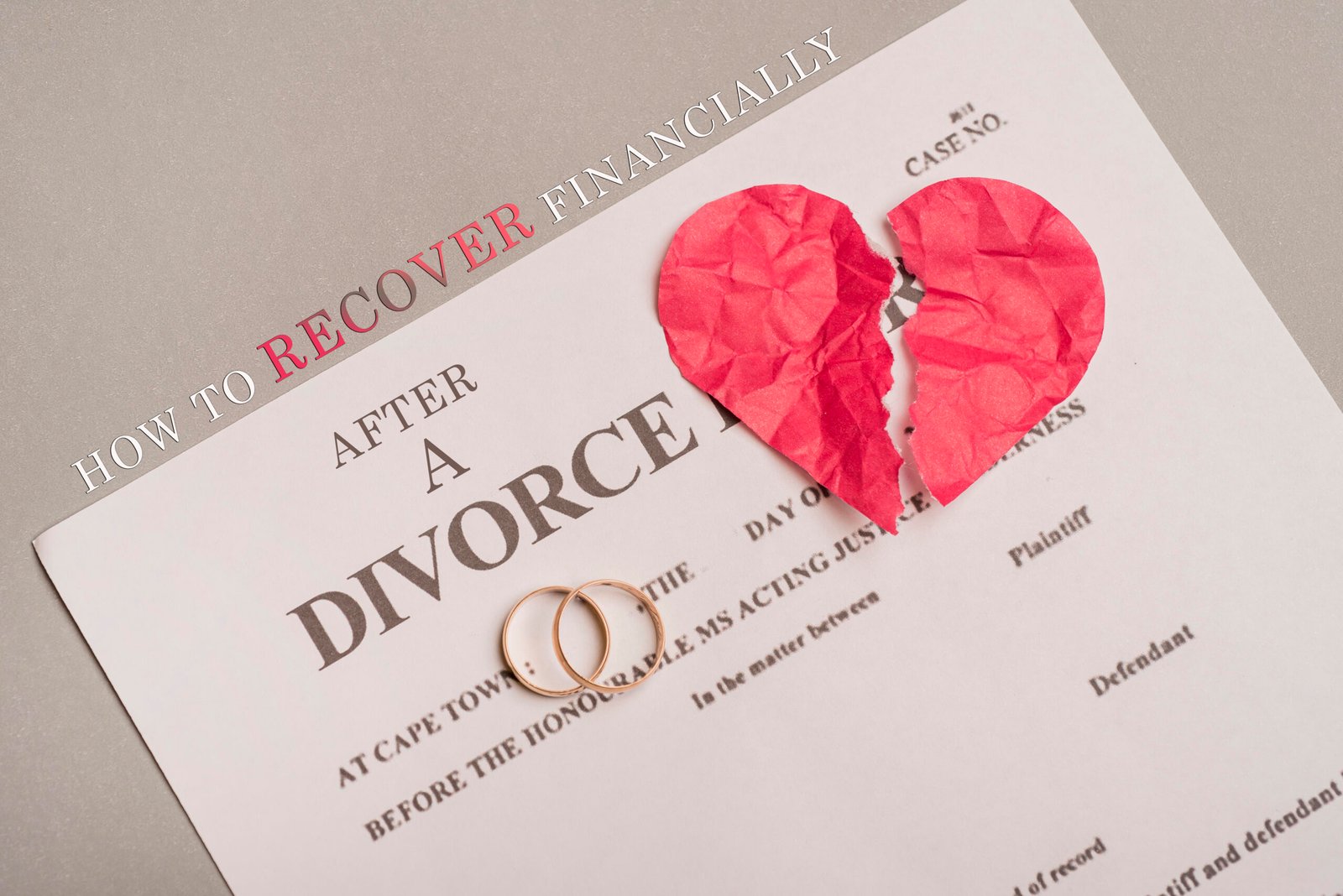This Article will show how to Recover Financially After a Divorce, why You Need to Be Financially Stable, what You Need to recover from Divorce, how I Analyzed That I’m Not Financially Stable, and steps to Financial Recovery After Divorce. Complete step-by-step guide. Include Advantages and Disadvantages with Frequently Asked Questions and Conclusion.
How to Recover Financially After a Divorce?
Divorce can be an emotionally and financially devastating experience. The unraveling of a shared life often includes splitting bills, assets, assuming new expenses, and navigating emotional strain while trying to stay afloat financially. Whether you were the primary earner or the dependent spouse, the financial transition can be jarring and overwhelming. However, with strategic planning, intentional budgeting, and patience, it is absolutely possible to regain your financial footing.
Divorce not only dissolves a personal relationship, but it also dissolves a financial partnership. Joint debts, credit cards, mortgage responsibilities, and shared investments suddenly shift from mutual responsibilities to individual burdens. This sudden solo financial responsibility can cause anxiety. Rebuilding after a divorce involves reassessing your income sources, managing debts, recalibrating your financial goals, and, in many cases, learning financial independence from scratch.
The financial strain also affects lifestyle, especially when one household’s income now needs to support separate lives. Expenses can rise, and savings can decrease, leaving a person vulnerable to financial hardship. But the good news is that with time and discipline, many people emerge stronger and wiser about managing their money after a divorce. The key lies in developing healthy financial habits, leveraging available resources, and approaching your recovery with a long-term perspective.
Once the legal paperwork is finalized and emotions begin to stabilize, it’s time to regain control over your finances. This period can also serve as a clean slate to improve your relationship with money. Whether it’s starting a new job, revisiting your budget, or renegotiating existing debts, the goal is to slowly build a new financial future that supports your independence and peace of mind.
Let’s explore step-by-step how to recover financially after a divorce, focusing on clarity, empowerment, and strategic action to build a brighter financial future.
Why You Need to Be Financially Stable
Financial stability after a divorce isn’t just about having enough money—it’s about regaining control of your life and building a secure foundation for your future. Divorce can be emotionally and mentally draining, but its financial implications often last longer and cut deeper. Stability allows you to make decisions with clarity and confidence, which is essential as you begin to rebuild your new life independently. Without a financial cushion, even small unexpected costs can lead to stress and setbacks, making stability a critical goal.
In the absence of financial security, emotions like fear and anxiety can cloud your judgment. You may find yourself making decisions based on short-term survival instead of long-term success. Financial stability reduces this mental burden, allowing you to focus on healing emotionally and rediscovering your purpose. It also gives you the flexibility to make empowering choices, such as changing careers, moving to a new place, or pursuing educational opportunities.
Additionally, being financially stable post-divorce helps you take care of your obligations effectively, whether it’s co-parenting responsibilities, shared debts, or household needs. If children are involved, it becomes even more important to maintain a stable environment that doesn’t cause them additional stress. Financial stability allows you to prioritize your needs without constantly juggling your own.
Moreover, establishing stability early ensures that you avoid falling into a cycle of debt or unhealthy financial habits. Divorce can be expensive, and rebuilding from that financial blow can take years if not handled properly. Budgeting, setting goals, and creating a reliable income stream can mitigate long-term damage and help you reclaim your power.
Finally, financial stability restores your sense of self-worth. Divorce can leave many people feeling lost or diminished, and taking charge of your finances can be a powerful step toward self-reliance and empowerment. As your bank account grows and your debts shrink, so does your confidence. This internal growth, powered by external stability, sets the stage for a stronger, more resilient you.
What You Need to Recover from Divorce
Recovering financially from a divorce requires a mix of emotional resilience, practical tools, and strategic planning. One of the most essential elements is having a reliable budget. A well-structured post-divorce budget will help you track expenses, cut unnecessary costs, and make room for savings. It’s also the first step in moving away from the shared financial life you once had and building a new one that works solely for you.
Another important component is an emergency fund. After divorce, you’re solely responsible for your well-being, and having a financial safety net can prevent further stress if unexpected expenses arise. Start small if necessary, even setting aside $20–$50 per week can build a solid buffer over time. This fund becomes your foundation and reduces dependence on credit cards or loans in times of need.
You’ll also need updated financial documents. These include a revised will, insurance beneficiaries, and new bank accounts if you closed joint ones. Understanding your legal obligations, such as real estate dealing, alimony, child support, or asset division, is crucial. Partnering with a financial advisor or lawyer can clarify complex legal and tax issues and help you make informed decisions.
Mental clarity is another underrated necessity. Financial recovery doesn’t happen in a vacuum—it requires focus and discipline. Emotional decisions like overspending for temporary comfort or avoiding bills due to stress can cause long-term harm. Therapy or support groups can help you stay mentally grounded, while a financial journal or spreadsheet can track your progress and celebrate small wins.
Last, you need new financial goals such as real estate investment, the share market, crypto investment, etc. After years of planning a future as a couple, it’s time to define your own vision. Whether it’s owning a home, saving for your children’s education, or investing for retirement, your new financial goals will guide your efforts and provide a roadmap to long-term recovery and fulfillment.
How I Analyzed That I’m Not Financially Stable
Recognizing financial instability is the first step toward fixing it, and often, the signs are subtle until they become overwhelming. One of the first indicators is living paycheck to paycheck with no savings buffer. If you find yourself unable to cover emergencies like a car repair or medical expense without borrowing money or using a credit card, that’s a strong signal that your finances are unbalanced.
Another sign is mounting debt or an inability to make minimum payments on credit cards, loans, or utility bills. If you’re juggling due dates, borrowing from one source to pay another, or avoiding certain bills altogether, your financial structure likely needs urgent attention. This type of cash flow issue can compound quickly and leave you with more debt than you can manage.
Analyzing your budget—or lack of one—can also reveal instability. If you’re unsure where your money goes each month, or if expenses regularly exceed your income, then you’re likely not in control of your financial life. A working budget should align with your priorities and make room for saving, even investing in small amounts. When this isn’t happening, it’s a sign that something needs to be adjusted.
Emotional spending is another major clue. If you’re using shopping, dining out, or travel as a coping mechanism for the stress and sadness of divorce, this can lead to long-term damage. Track your discretionary spending to see if it’s outpacing your income or eating into necessary funds like rent or insurance. A pattern of such behavior signals emotional influence over financial decisions, which often leads to instability.
Lastly, look at your future plans—or lack thereof. If you don’t have any financial goals or retirement plans, or if you feel overwhelmed by the idea of planning for the future, it suggests you’re not financially grounded. A financially stable individual feels confident, if not excited, about building their future. The absence of such clarity often reflects the underlying insecurity that needs to be addressed.
Steps to Financial Recovery After Divorce
Recovering financially after a divorce is not a quick fix—it’s a step-by-step journey that demands focus, discipline, and a strong sense of direction. Many individuals emerge from a divorce feeling overwhelmed by new financial responsibilities, such as managing solo income, covering legal fees, or adjusting to alimony or child support. However, with the right roadmap, rebuilding your financial life can become a source of empowerment rather than stress.
The first and most critical step is acceptance. You must accept your new financial reality—whether it’s reduced income, increased expenses, or shared responsibilities like co-parenting. Only by facing your current position honestly can you take meaningful action. This clarity lays the groundwork for creating a new, independent financial plan that supports your evolving needs.
Next, prioritize creating a new budget tailored to your solo lifestyle. This isn’t just about cutting costs but rediscovering what matters most to you. It’s a chance to define your priorities, eliminate unnecessary expenditures, and build new goals for savings and growth. A good budget provides stability, and stability creates peace of mind.
Finally, financial recovery after divorce also includes emotional resilience. Healing is not only emotional—it’s also financial. Each financial win, whether it’s paying off a debt or reaching a savings goal, contributes to rebuilding confidence and control. With the right steps in place, financial recovery becomes a powerful chapter of self-reinvention.
1. Assess Your New Financial Situation
Start by reviewing your income, debts, and monthly expenses. Identify changes in your lifestyle or obligations post-divorce, such as alimony, child support, or new rent payments. This full-picture review will help you know where you stand and what adjustments are necessary to regain control over your finances.
2. Create a Post-Divorce Budget
Build a new budget from scratch that reflects your current income and solo living expenses. List your essentials first—housing, food, utilities—and then add discretionary expenses. Make sure to include savings, even if it’s small at first. This gives you a structure and shows where you need to tighten up or make lifestyle changes.
3. Open Individual Bank and Credit Accounts
Ensure financial independence by separating all joint accounts. Open your own bank accounts, credit cards, and investment platforms. This protects your money, builds your credit individually, and helps you clearly track your new financial journey without entanglements.
4. Rebuild or Establish Emergency Savings
Divorce can deplete your emergency funds. Prioritize rebuilding a cushion for unexpected events—ideally, 3–6 months of living expenses. This fund is essential for peace of mind and avoids reliance on high-interest debt when unplanned costs arise.
5. Reevaluate Insurance and Retirement Plans
Update your life, health, and car insurance beneficiaries. Reassess your retirement savings goals and ensure you’re contributing independently through a 401(k), IRA, or other plans. If assets were divided, work with a financial planner to maximize what’s left and set new goals.
6. Review and Repair Your Credit
Check your credit score and report to make sure everything is accurate, especially if your ex-spouse was added to accounts. Pay down balances, avoid new debts, and consider secured credit cards if your credit took a hit during divorce. A healthy credit score is vital for renting, buying, or even job opportunities.
7. Seek Legal and Financial Advice
Hire a family law attorney for lingering legal issues and consult a financial advisor for long-term recovery strategies. Professional guidance can help protect your assets, avoid legal missteps, and build a tailored plan based on your goals, debts, and income.
8. Increase Your Income
If your current income isn’t enough to support your post-divorce lifestyle or goals, consider side hustles, part-time jobs, or monetizing a hobby. You can also ask for a raise or pursue additional training to qualify for a higher-paying job. More income gives you flexibility and faster recovery.
9. Plan for Your Children’s Financial Needs
If you share custody or financial responsibility for kids, plan ahead. This includes budgeting for education, medical costs, clothing, and other shared expenses. Establish agreements early and consider opening an education fund (like a 529 plan) if possible.
10. Set Short- and Long-Term Financial Goals
Whether it’s becoming debt-free, buying a home, or building a new retirement plan, write down your goals. Break them into short-term (within 12 months) and long-term (5–10 years). These give you motivation and measurable progress to stay on track as you rebuild.
Advantages and Disadvantages of Financial Recovery
The financial openness that comes from being answerable to one’s typically translates to more trust, not money, to be sure, but the other large aspects of life, such as career and personal growth. There are a few drawbacks, however, and they are largely temporary
One of the largest disadvantages is the immediate decrease in two incomes, which places a strain on your capacity for the same standard of living. Charges previously shared—such as rent or mortgage, utilities, and child care—are now yours. These can cause stress and anxiety, particularly if legal fees or debts incurred in the divorce process are also present. Emotional exhaustion can get in the way of decision-making, making it more difficult to adhere to budgets or financial objectives. A second disadvantage is the long-term effect on savings and retirement.
If you do have to split joint assets or sell them, recovery takes two years. You may even face tax, insurance, and investment issues to sort out that take longer, and some guidance. It’s also simple to fall into reactive habits about money, such as working overtime to make more cash or living for today at the expense of planning for tomorrow. Prevention of these traps depends on possessing a proper recovery financial strategy and gaining professional guidance.
Advantages:
- Greater Control Over Personal Finances
- Opportunity for a Fresh Financial Start
- Improved Financial Literacy and Independence
- Freedom to Rebuild Credit Individually
- Motivation to Pursue New Career or Income Opportunities
Disadvantages:
- Loss of Dual Income
- Higher Living Expenses as a Single Individual
- Potential Legal and Court-Related Debts
- Tax Complications and Filing Changes
- Emotional Stress Impacting Financial Decisions
FAQs:
Q1. How long does it take to recover financially after a divorce?
It varies depending on income, debts, and lifestyle. On average, it may take 1–3 years to feel financially stable again.
Q2. Should I hire a financial advisor after a divorce?
Yes, a financial advisor can help structure your post-divorce financial life, especially with retirement, investments, or large settlements.
Q3. What happens to joint debt after divorce?
Joint debt may still be legally shared, depending on court orders. Always confirm whose name is on the contract and seek legal advice for clarity.
Q4. Can I qualify for loans or a mortgage after divorce?
Yes, but your credit score, income, and debt-to-income ratio will be scrutinized. Rebuilding credit is essential before applying.
Q5. Should I move out immediately after a divorce?
Only if your finances can handle it. Consider costs like deposits, rent, moving expenses, and basic furniture or setup before relocating.
Conclusion:
Exiting divorce with your finances in order is not about money—about stable, secure, and being in control feelings. No matter how intimidating it may seem at first, being equipped with a solid financial plan, reducing spending, and creating new money routines will bring strength and authority. Begin anew, re-create goals, or begin again; every movement towards achievement matters. Budgeting before anything else, rebuilding credit first, and long-term planning second, and with professional help when needed. With resilience and strategy, you’ll not only recover but thrive.
References:
- Investopedia – Financial Recovery After Divorce
- NerdWallet – Post-Divorce Budgeting Guide
- LegalZoom – Managing Debt After Divorce









2 thoughts on “How to Recover Financially After a Divorce? | Greatest 10 Steps Guide”